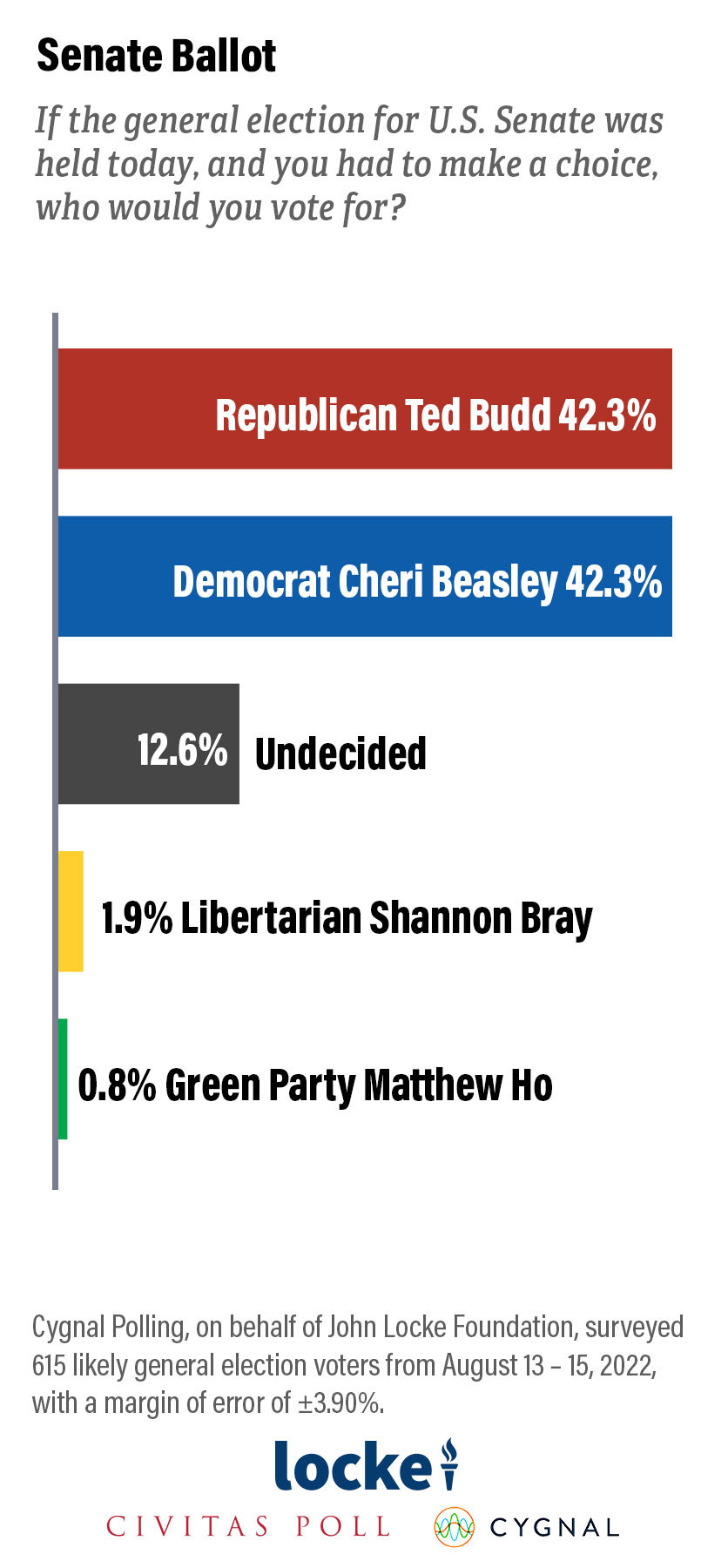- The generic ballot for congressional and legislative races has narrowed slightly since June, according to the results of a new Civitas poll.
- In the U.S. Senate race, Republican Ted Budd and Democrat Cheri Beasley are tied at 42% apiece.
- President Joe Biden’s approval rating in N.C. stands at 39%, compared to 33% in June.
A new Civitas poll of likely voters in the 2022 midterm elections shows slight movement in favor of Democrats as the summer winds down. Even so, Republicans maintain a healthy advantage on the generic congressional and state legislative ballot, and President Joe Biden’s approval rating remains at historic lows.
Asked their preference on a generic legislative ballot between Republicans and Democrats, 48% chose the GOP and 43% Democrats — a narrowing from June when the split was 51% Republican and 39% Democrat.
The gap has slimmed even more on the generic congressional ballot, with 47% choosing Republicans and 44% Democrats, compared to a 52% to 41% split in June.
“This growing competitiveness in the generic ballots for both the state legislative and congressional contests seem to show a sense of party loyalty overcoming the presidential disapproval dynamic,” said Dr. Michael Bitzer, professor of politics and history at Catawba College in Salisbury. “Of course, the key state legislative battles will be in the truly competitive districts of both chambers, so maybe 20 seats out of the 170 could determine not just control, but super-majority control of the general assembly.”
The race for North Carolina’s open U.S. Senate seat is in a statistical dead heat. Republican Ted Budd, a congressman from the state’s 13th Congressional District; and Democrat Cheri Beasley, a former chief justice of the N.C. Supreme Court, are tied at 42% apiece. Around 13% of voters are undecided. In June, Budd had a 45% to 40% lead over Beasley.

“Beasley is likely benefiting from using her war chest to be on television throughout the summer, keeping the framing on her terms against Budd,” said Bitzer. “In addition, the Dobbs decision and now the continued news about the former president will likely be key motivators for Democrats. The question is, can that motivation be sustained until November?”
Republican candidates for the N.C. Supreme Court maintain more comfortable leads in their races, according to the poll results. Republican Richard Dietz leads 45% to 39% for Democrat Lucy Inman. Republican Trey Allen also commands 45% support to Democrat Sam Ervin’s 40%.
“It is difficult to say if this movement toward Democratic candidates will continue as the national political climate is very volatile,” noted Dr. David McLennan, a political science professor at Meredith College in Raleigh. “Although Democrats may benefit from the abortion decision made by the Supreme Court, issues surrounding the legal status of former President Trump and the economy may blunt the Democrats’ momentum.”
Sixty-five percent of respondents say the country is headed in the wrong direction, while 26% say right direction. Those numbers are a slight improvement since June, when 72% said wrong track and 22% said right track.
President Biden’s approval rating stands at 39%, compared to 33% in June. Fifty-six percent of respondents disapprove of the president, an improvement from 60% in June.
Distrust of American institutions remained high, with 71% saying they have little to no trust in Congress. Voters’ opinions on other institutions drew a response more divided along partisan lines: Only 20% of Republicans have a great deal or fair amount of trust in the FBI, compared to 78% of Democrats; while only 21% of Democrats have a great deal or fair amount of trust in the U.S. Supreme Court, compared to 67% of Republicans.
“More and more governmental institutions are losing the trust of the American people,” said Donald Bryson, president of the John Locke Foundation. “The findings of our questions on institutional trust align with the lack of faith we are seeing in our election systems — with less than half of North Carolinians believing this year’s elections will be free and fair in previous surveys.”
On the question of whether the U.S. is in a recession, 66% said yes and 20% no. Even so, respondents weren’t overly concerned about losing their jobs, with 67% not worried at all and 25% worried. Eighty-eight percent are concerned about energy and gas prices, and 60% favor “a federal law that would dramatically increase oil and gas drilling in the United States.”
On the question of abortion, 39% of respondents identified as pro-life and 48% as pro-choice. Forty-four percent favor reinstating the state’s 20-week ban on abortion, with 43% opposed. The poll results landed the day after a federal judge lifted an injunction and reinstated North Carolina’s ban on most abortions after 20 weeks of pregnancy.
Asked “Do you approve or disapprove of the state employee health plan covering sex changes or modification treatments,” 30% approved and 55% disapproved.
The poll was conducted August 13-15 and surveyed 615 likely general election voters.